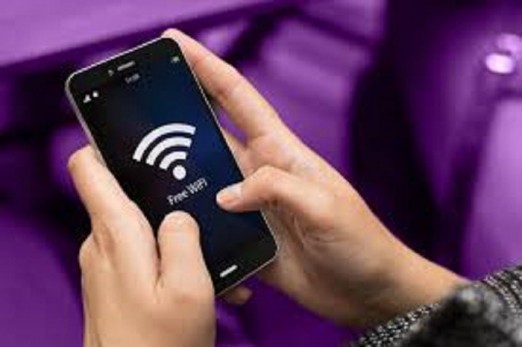Do not use public Wi-Fi

February 11,Kathmandu.In today 's time, the Internet has become an important part of people's lives. People use the Internet for online classes, digital learning, office work, OTT platforms and social media. However, the biggest problem occurs when we are at a place where the mobile data and Internet are not working.
In such a situation, people look for public Wi-Fi. Usually public Wi-Fi is available at public places like railway station, bus stop, airport, hotel or restaurant. It is completely free. Anyone can connect it to their mobile, tablet or laptop. Using public Wi-Fi is convenient, but it can also be risky.
Recently, the University Grants Commission (UGC) has advised students not to log in to their personal or professional accounts using public Wi-Fi as its use can lead to people falling prey to scams or fraud.
So, let's talk about why public Wi-Fi is not safe
What is public Wi-Fi?
This is a wireless internet connection that is installed in public places like cafes, restaurants, airports, railway stations and public libraries. Usually this facility is completely free. Anyone can use it by entering a common password. At many places, you can connect public Wi-Fi directly to your device even without a password.
What are the benefits of public Wi-Fi?
Public Wi-Fi is needed the most during travel. Internet becomes weak especially in metro stations, big markets, stadiums and crowded areas. In such a situation, you can get better connectivity by using public Wi-Fi.
Why can using public Wi-Fi be dangerous?
Cyber expert Pawan Duggal says that anyone can connect to public Wi-Fi. Hackers can put malware or virus in your phone or laptop through public Wi-Fi, which can hack your system. This is the reason why the risk of hacking and data theft increases on public Wi-Fi.
In which places is it more dangerous to use public Wi-Fi?
Often the security of public Wi-Fi is weak. Also, being an open network, it is easy for cyber criminals to target them. Therefore, one should avoid using public Wi-Fi in some places. Understand these points-
Cafes and restaurants: Some cafes and restaurants provide free Wi-Fi, but their network security is not strong. Hackers can set up fake Wi-Fi networks in such places, which can lead to theft of users' information.
Shopping malls and retail stores: People use free Wi-Fi in shopping malls to make payment transactions or use social media apps. At such places, your bank details can be stolen through phishing attacks and malware.
Airports and railway stations: Often thousands of people are present at public places like airports and railway stations. In such a situation, hackers can steal your personal data through fake Wi-Fi portals.
Hotels and Resorts: Often hotels and resorts do not keep the security of their public Wi-Fi updated. Due to this, malware or virus can reach your device. In such a situation, if you login to any banking site or social media app from the hotel Wi-Fi, then hackers can steal your sensitive information.
Share this with your friends:
प्रत्येक महिला पुरुषभन्दा कमजोर छैनन् : कमला भासिन
 नरेश ज्ञवाली ►
भदौ २७, काठमाडौं। दक्षिण एसियामा लैङ्गिक समानता, शिक्षा, गरिबी निवारण, मानवअधिकार र शान्तिका...
नरेश ज्ञवाली ►
भदौ २७, काठमाडौं। दक्षिण एसियामा लैङ्गिक समानता, शिक्षा, गरिबी निवारण, मानवअधिकार र शान्तिका...
पुरुष कलमले पूर्ण नारीलाई लेख्न सक्दैन
 काठमाडौं। मान्छेहरू कडा भएर बोलेको भन्दा नरम भएर बोलेको मनपर्छ । खरा कुराभन्दा नरम, सरस र सलिल कुराहरू मनपर्छ । तर...
काठमाडौं। मान्छेहरू कडा भएर बोलेको भन्दा नरम भएर बोलेको मनपर्छ । खरा कुराभन्दा नरम, सरस र सलिल कुराहरू मनपर्छ । तर...
कालो तिलले कम्मर दुखेको र अनुहारमा भएको पोतोको उपचार गर्छ
 काठमाडौं । कालो तिल अथवा तिलबाट प्राप्त हुने बिऊ तेल उत्पादनको लागि प्रयोग गरिन्छ । अनुहारमा चायाँ, पोतो वा दाग,...
काठमाडौं । कालो तिल अथवा तिलबाट प्राप्त हुने बिऊ तेल उत्पादनको लागि प्रयोग गरिन्छ । अनुहारमा चायाँ, पोतो वा दाग,...
दुबईमा पहिलो पटक नेपाली कल्चरल पहिरनको फेसन शो सम्पन्न
 काठमाडौं। गत माघ २८ गते दुबईमा नेपाली कल्चरल पहिरनको फेसन शो पहिलो पटक फेसन फ्युजन २०१७ सम्पन्न भयो । एनआरएन...
काठमाडौं। गत माघ २८ गते दुबईमा नेपाली कल्चरल पहिरनको फेसन शो पहिलो पटक फेसन फ्युजन २०१७ सम्पन्न भयो । एनआरएन...
उमेर अनुसारको हुनुपर्छ खान्की, अनि मात्र मानिस स्वस्थ रहन्छ
 काठमाडौं। पोषणको आवश्यकता उमेरअनुसार परिवर्तन हुन्छ । उमेरको हरेक अवस्थामा स्वयंलाई स्वस्थ राख्न शरीरलाई...
काठमाडौं। पोषणको आवश्यकता उमेरअनुसार परिवर्तन हुन्छ । उमेरको हरेक अवस्थामा स्वयंलाई स्वस्थ राख्न शरीरलाई...
यी भोजन खाए छाला सुन्दर हुन्छ !
 काठमाडौं। स्ट्रबेरी : यो भिटामिन सीले भरपुर हुन्छ । भिटामन सीले छालालाई चाउरीबाट जोगाएर सधैं जवान राख्न मद्दत...
काठमाडौं। स्ट्रबेरी : यो भिटामिन सीले भरपुर हुन्छ । भिटामन सीले छालालाई चाउरीबाट जोगाएर सधैं जवान राख्न मद्दत...
मुलुकका सम्मानित पदमा महिलाको उपस्थिति, सबैका लागि आशाको ढोका उघारे
 काठमाडौं। अहिले नेपालका तीनवटै अंगका प्रमुख महिला भएकाले नेपाली राजनीतिक क्षेत्रमा मात्र नभएर सामाजिक...
काठमाडौं। अहिले नेपालका तीनवटै अंगका प्रमुख महिला भएकाले नेपाली राजनीतिक क्षेत्रमा मात्र नभएर सामाजिक...
लोग्नेमान्छेको जात केटी देखेपछि.....
 काठमाडौं । शान्ताको विवाह भएको पाँच वर्ष बितिसक्दा पनि छोराछोरी भएनन् बरु उनलाई एकाएक ब्लड क्यान्सर भयो । समयले...
काठमाडौं । शान्ताको विवाह भएको पाँच वर्ष बितिसक्दा पनि छोराछोरी भएनन् बरु उनलाई एकाएक ब्लड क्यान्सर भयो । समयले...
मनोसामाजिक समस्या के हो?
 साउन ११, काठमाडौं । मनोसामाजिक समस्या भन्नाले मन र समाज वीच हुने समस्या हो । यो जो कोही व्यक्तिलाई पनि हुन सक्छ ।...
साउन ११, काठमाडौं । मनोसामाजिक समस्या भन्नाले मन र समाज वीच हुने समस्या हो । यो जो कोही व्यक्तिलाई पनि हुन सक्छ ।...
महिलाको दोस्रो विवाहको कुरा सुन्दा पढेलेखेकैले अनुहार बिगार्छन्
 काठमाडौं। दोस्रो विवाहबारे मैले नसोचेको, नचाहेको होइन । तर, म मेरा आत्मीयसँग फेरि विवाह गर्नेबारे कुरा गर्छु,...
काठमाडौं। दोस्रो विवाहबारे मैले नसोचेको, नचाहेको होइन । तर, म मेरा आत्मीयसँग फेरि विवाह गर्नेबारे कुरा गर्छु,...










